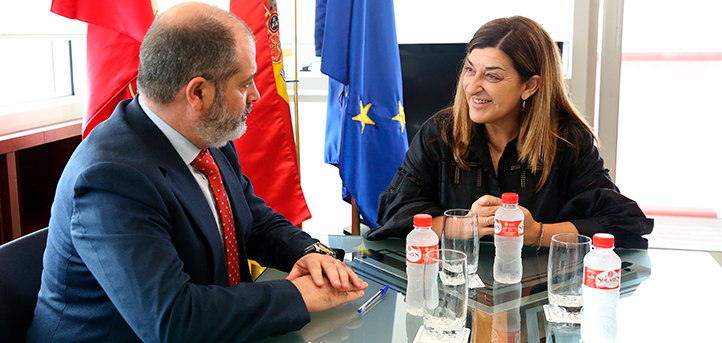Rubén Calderón, Rector of the Universidad Europea del Atlántico (European University of the Atlantic) (UNEATLANTICO), holds meetings with the President of Cantabria, María José Sáenz de Buruaga, and the Minister of Education, Sergio Silva.
As part of the regular meetings that UNEATLANTICO holds with Cantabrian institutions, Rubén Calderón has held a meeting with the regional president, María José Sáenz de Buruaga, where he has told her about the project for a new student residence designed to increase the number of accommodation places available.
In this sense, the project responds to the constant increase of students and the consequent increase of habitability needs generated by the success of UNEATLANTICO, where thousands of students study the 15 official degrees and numerous postgraduate courses offered. The new facility, on the other hand, would require a significant economic investment, and the entity is considering different sites for its future construction. In any case, these second accommodations would be in addition to the existing UNEATLANTICO Residence, which already houses hundreds of students, with the aim of “making the university grow and Cantabria grow,” according to Calderón.
After the meeting, the rector and the president highlighted the “good harmony” existing between the University and the Cantabrian executive, which is part of the fruitful and regular institutional relations that UNEATLANTICO has maintained since its inception with the regional authorities. In this context, Sáenz de Buruaga pointed out that the new student residence project can contribute to “further internationalize” the university environment in Cantabria and to turn the autonomous community into “the nerve center of new transnational academic projects.”
In this way, Buruaga stated that the future projects of UNEATLANTICO highlight the “importance of its dimension and projection in attracting students from other parts of the national geography and, especially, from the international area where FUNIBER is present,” in reference to the global collaboration network of the Iberoamerican University Foundation (FUNIBER) in which UNEATLANTICO participates.
Thus, the regional president highlighted the high rate of foreign students, with around a third of international students in undergraduate programs and more than half in master’s programs. Buruaga emphasized that UNEATLANTICO students act as “ambassadors” of Cantabria abroad, as well as the role of Spanish as a “common link” for the numerous students coming from Latin America.
Likewise, the regional president said that she hopes that the highly qualified human capital and talent that forms UNEATLANTICO will choose Cantabria to develop their future work projects and, in this way, contribute to a greater attraction of productive projects and investments in the Cantabrian business network.
Meeting with the Minister of Education
Rector Rubén Calderón also met with the Regional Minister of Education, Vocational Training and Universities, Sergio Silva, in a first contact where they discussed general issues affecting the university framework and its regulation, as well as specific issues that directly affect UNEATLANTICO, “an asset to promote development and regional balance,” according to the Minister.
In this sense, Silva has indicated that, from the Ministry of Education, all collaboration is offered to “continue moving forward together” and contribute to UNEATLANTICO continue weaving a network of knowledge that benefits Cantabria and expands its university offerings. The meeting, which both parties described as very cordial, was also attended by the Director General for Universities and University Policy, Marta Pascual.
For his part, Rubén Calderón emphasized the importance of being able to develop joint collaborative projects that benefit the autonomous community and highlighted the fact that UNEATLANTICO has implemented 15 undergraduate and 16 master’s degrees in five branches of knowledge.
The academic authority recalled the importance of UNEATLANTICO and its international character, pointing out that it represents a very significant percentage of university studies and students in Cantabria, as well as the high rate of international students.


